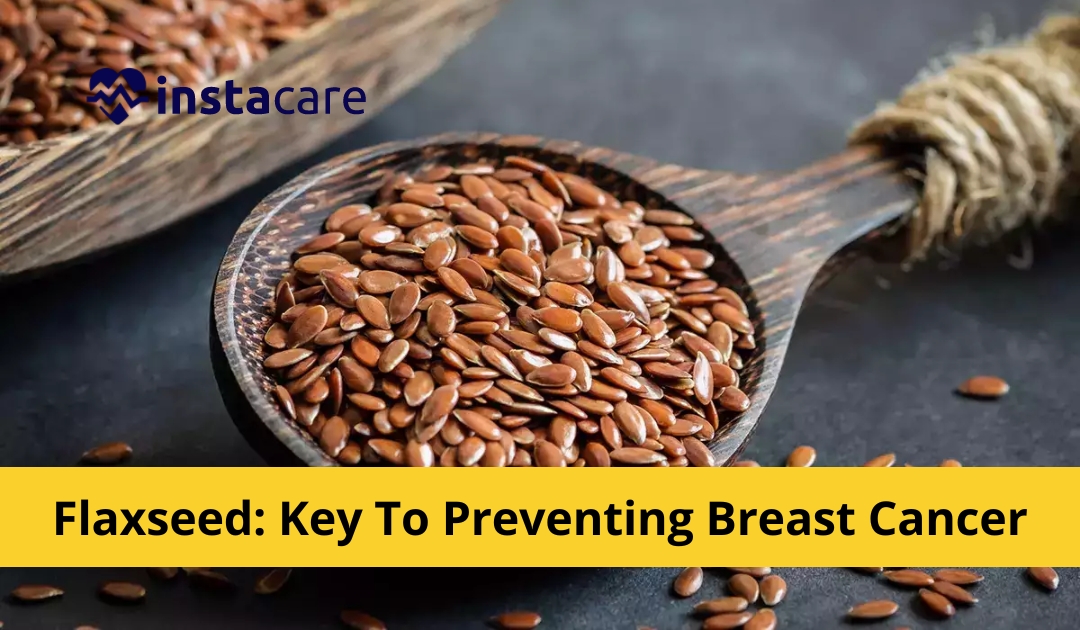For centuries flaxseeds have been an essential component of human diets around the world. But in recent decades, researchers have come to understand just why it is so beneficial—flaxseed has a powerful capacity to reduce cancer risk and improve overall health. In particular, studies suggest that flaxseed may be linked with reduced breast cancer risk for women, making this nutritional powerhouse one of the best preventative strategies against the disease. Read on to learn more about how incorporating flaxseed into your daily diet can help protect you from breast cancer!
What is flaxseed and where does it come from?
Flaxseed is a small brown seed that is a great source of fiber, protein, and fatty acids. It has been an important part of human diets for thousands of years, being cultivated for its oil-rich seeds and fibers. Flaxseed primarily originates from the Middle East and Egypt due to the favorable climates there. Today it is grown across many parts of the world with the most production occurring in India, China and Canada.
These days, we can find flaxseed readily available in a variety of products such as milled flour, ground meal, oil or capsule form at our local supermarkets. With nutritional benefits ranging from improved digestion to reduced inflammation and cholesterol levels, it's no wonder why people are adding this powerhouse food to their regular diets!
How can flaxseed help prevent breast cancer ?
Flaxseed is a powerful superfood that can be easily added to your daily diet to potentially reduce the risk of developing breast cancer. The main active ingredients in flaxseed involve lignans, which act likes antioxidants and can protect the body from ceasing tumor growth or formation. Studies have shown that the lignan content of flaxseed also has an anti-estrogenic effect which helps reduce cell damage caused by estrogen hormones involved in making breast cancer worse.
Flaxseed also contains essential fatty acids that have been known to help reduce inflammation levels and improve hormone balance in the body, both of which are essential for reducing the likelihood of developing cancer. When adding flaxseeds to your diet, it is important to ground them for best absorption into your system, as whole seeds will simply pass through your digestive system without providing any additional benefit.
View More: Top 10 Ways To Prevent Breast Cancer
What are some of the benefits of adding flaxseed to your diet on a regular basis?
Adding flaxseed to a regular diet can be beneficial in many ways. Flaxseed has high amounts of fiber, which helps to improve digestion and keep you feeling full for longer. It is also a great source of healthy fats such as omega-3 fatty acids, which are beneficial to overall health - they help reduce inflammation, support blood pressure and cholesterol levels, contribute to brain function improvement, and may even benefit skin health. Additionally, flaxseed contains lignans (a type of phytochemical) that possess antioxidant activity.
This could mean that adding flaxseed to your diet on a regular basis could boost immunity and help protect against certain illnesses due its anti-inflammatory properties. All in all, including flaxseed in your diet can be an easy way to increase the intake of vitamins and minerals alongside other benefits like improved digestion, reduced inflammation, better heart health and likely improved immunity as well.
Are there any risks associated with consuming too much flaxseed oil or ground flaxseeds on a daily basis?
Consuming too much flaxseed oil or ground flaxseeds every day can increase your risk of adverse health effects due to their high content of omega-3 fatty acids, dietary fibers, and plant lignans. Overconsumption of these substances will put a strain on your digestive system and may cause nausea, abdominal discomfort, constipation, and diarrhea.
Excessive intake of certain micronutrients contained in them such as vitamins, minerals, fiber or phytoestrogens can also cause health problems. It is important to stick to the recommended dosages for either product so that you do not experience any negative health impacts.
How can you add more flaxseed to your diet?
Flaxseed is a great addition to your diet, offering many health benefits such as improved digestion, healthy heart activity and improved skin health. It's high in dietary fiber and omega-3 fatty acids and is a great source of protein and minerals like iron, magnesium, and calcium.
There are many ways to add more flaxseed to your diet. You can mix ground flaxseed into oatmeal or sprinkle it over cereal or yogurt. You can also bake with ground flaxseed in things like muffins, breads and pancakes. Flaxseeds can be added to smoothies for a nutritious boost, or you can make flax meal energy bars for an energy-packed snack on the go! Lastly, top salads with freshly-ground flaxseeds for a crunchy dose of nutrition.
View More: Self Examination Methods For Breast Cancer Detection
Do any other foods contain similar cancer-fighting properties as flaxseed does?
There are several other foods that contain similar cancer-fighting properties as flaxseed. Cruciferous vegetables such as kale, cauliflower, and Brussels sprouts contain glucosinolates which have anti-cancer properties. Berries are also a great source of cancer fighting antioxidants. Blueberries and blackberries in particular are very high in Vitamin C, ellagic acid and anthocyanins which make them especially powerful against cancer.
Additionally, apples contain quercetin which may help protect cells from damage that can potentially lead to cancer. By adding these foods to the diet, alongside flaxseed, it is possible to up the amount of cancer-fighting elements in your diet significantly.
Please book an appointment with the Best Doctors For Breast Cancer in Pakistan, Karachi, Islamabad, and all major cities of Pakistan through InstaCare, or call our helpline at 02137136090 to find a verified doctor for your disease.
Source: https://instacare.pk/blog/flaxseed-and-breast-cancer











